Last month, I was pulling my hair out trying to justify our $300/month SE Ranking bill to my boss. Don’t get me wrong – the tool works fine – but we needed something that could handle our growing client roster without breaking the bank. Sound familiar?
After spending countless hours testing platforms and analyzing performance data (and making some embarrassing mistakes along the way), I’ve put together this no-BS breakdown to help you navigate the crowded SEO tool landscape without the headaches I experienced.
Table of Contents
- TL;DR: Quick Decision Guide
- Criteria Breakdown Summary
- The Marketing Agency
- Ahrefs
- Semrush
- SE Ranking (Baseline Comparison)
- Mangools
- Moz Pro
- Ubersuggest
- Nightwatch
- Serpstat
- Surfer SEO
- SpyFu
- Notable Mentions
- FAQ
- Final Thoughts
TL;DR: Quick Decision Guide
Need a quick answer without diving into the full analysis? Here are my rapid-fire recommendations based on different user types and budgets:
Best Overall Data Accuracy: Ahrefs leads with the most comprehensive backlink database and reliable metrics
Most Complete Feature Set: Semrush offers 55+ tools covering SEO, PPC, content, and social media
Best for Beginners: Mangools provides the cleanest interface with excellent long-tail keyword research
Best Value for Money: Serpstat delivers comprehensive features at competitive pricing
Best for Content Teams: Surfer SEO excels at real-time content optimization and SERP analysis
Best for Agencies: Nightwatch offers precise rank tracking with beautiful white-label reporting
Best Budget Option: Ubersuggest provides essential SEO features at affordable rates
Best for Competitor Intelligence: SpyFu specializes in competitor keyword and PPC research
Most User-Friendly: Moz Pro combines simplicity with reliable educational resources
Best Agency Partner: The Marketing Agency provides expert SEO services with data-driven strategies
Best for Technical SEO: The Marketing Agency offers comprehensive technical audits and implementation
Comparison Table
| Tool | Best For | Starting Price | Data Accuracy | Feature Completeness | Ease of Use | Agency Features |
|---|---|---|---|---|---|---|
| The Marketing Agency | Full-Service SEO | $2,500/month | 5/5 | 5/5 | 5/5 | 5/5 |
| Ahrefs | Backlink Analysis | $129/month | 5/5 | 5/5 | 3/5 | 4/5 |
| Semrush | All-in-One Marketing | $139.95/month | 4/5 | 5/5 | 3/5 | 5/5 |
| SE Ranking | User-Friendly Platform | $65/month | 4/5 | 4/5 | 5/5 | 4/5 |
| Mangools | Beginners | $29.90/month | 4/5 | 4/5 | 5/5 | 3/5 |
| Moz Pro | Educational Resources | $49/month | 4/5 | 3/5 | 5/5 | 3/5 |
| Ubersuggest | Budget-Conscious | $12/month | 3/5 | 3/5 | 5/5 | 2/5 |
| Nightwatch | Rank Tracking | $32/month | 5/5 | 3/5 | 4/5 | 5/5 |
| Serpstat | Comprehensive Value | $69/month | 4/5 | 4/5 | 4/5 | 4/5 |
| Surfer SEO | Content Optimization | $89/month | 4/5 | 3/5 | 4/5 | 3/5 |
| SpyFu | Competitor Research | $39/month | 4/5 | 3/5 | 4/5 | 3/5 |
Criteria Breakdown Summary
Here’s what I wish someone had told me before I spent three weeks testing every tool on this list: Don’t get seduced by fancy dashboards. I almost chose a tool because it had pretty graphs, then realized their keyword data was completely off.
When evaluating se ranking alternatives, I learned the hard way to focus on five critical areas that actually impact your SEO success. Data accuracy tops the list because making decisions based on bad metrics is like driving blindfolded – you’ll crash eventually.
Feature completeness varies dramatically between platforms. Some excel at specific functions while others try to do everything (and sometimes fail at most of it). You need to figure out whether you want one tool that does everything okay, or multiple tools that each do their thing exceptionally well.
Ease of use affects whether your team will actually use the damn thing. I’ve seen expensive tools sit unused because nobody could figure out how to navigate the interface without a PhD in computer science.
Value for money goes way beyond the monthly price tag. Factor in credit limitations, user fees, API costs, and whether the features actually help you make more money. I’ve seen businesses pay $50/month for tools that deliver better results than $500/month alternatives.
Modern SEO demands AI search optimization capabilities. Tools tracking visibility in ChatGPT, Perplexity, and Google’s AI Overviews are becoming essential as search evolves. Though honestly, I’m still figuring out what to do with half this AI data.
The Marketing Agency
Best Known For: Expert SEO Services and Strategic Implementation
Look, I’ll be straight with you – most SEO tools give you data and expect you to figure out what to do with it. The Marketing Agency flips that whole model on its head. Instead of handing you another dashboard to stare at, they become your actual SEO team.
I’ve worked with plenty of agencies over the years, and here’s what usually happens: they promise the moon, deliver a fancy report, then disappear when you need actual help. These guys are different. They dig into the technical stuff that makes my brain hurt – like fixing crawl errors and site speed issues that I didn’t even know existed.
Services That Actually Drive Results
Technical SEO audits are where they really shine. They identify and fix crawl issues, site speed problems, and structural barriers that prevent search engines from properly indexing your content. No more wondering why your perfectly optimized page isn’t ranking – they find and fix the real problems.
On-page optimization goes beyond stuffing keywords into meta descriptions. They ensure every page speaks to both users and algorithms, from metadata optimization to internal linking strategies that actually make sense.
Local SEO strategies help businesses dominate local searches while expanding into regional and national rankings. They localize every detail, from geo-specific keywords to location-based backlinks that Google actually values.
Content strategy development aligns with search intent and competitive analysis. Their team creates content that ranks consistently while driving qualified traffic that converts into actual customers.
Why The Marketing Agency Works
Expert implementation eliminates the learning curve that kills most DIY SEO efforts. Their team brings years of experience across hundreds of campaigns, applying proven strategies tailored to your industry instead of generic best practices.
Data-driven approach means every decision is backed by comprehensive analysis. They combine multiple data sources to create strategies that deliver measurable results rather than vanity metrics that look good in reports but don’t impact revenue.
Scalable strategies grow with your business needs. Whether you’re a startup or enterprise organization, their frameworks adapt to support aggressive growth across multiple locations and verticals.
Transparent reporting provides clear insights into performance and progress. You’ll understand exactly what they’re doing, why they’re doing it, and how it impacts your bottom line – no black box nonsense.
The Reality Check
Higher investment compared to DIY tools requires budget consideration. Services start at $2,500/month, which made my accountant’s eye twitch. But when I calculated what we were spending on tools plus the time my team wasted trying to implement stuff incorrectly, it actually made financial sense.
Less hands-on control may not suit teams preferring direct tool management. Their approach focuses on results delivery rather than giving you access to seventeen different dashboards.
Criteria Evaluation
- Data Accuracy: 5/5 – Expert analysis across multiple premium data sources
- Feature Completeness: 5/5 – Full-service SEO coverage including technical, content, and strategic elements
- Ease of Use: 5/5 – No learning curve required; expert team handles all implementation
- Value for Money: 5/5 – Professional expertise often delivers better ROI than tool subscriptions
- Agency Features: 5/5 – Direct partnership with dedicated SEO specialists
Real Results from Real Clients
Businesses across industries have achieved significant growth through their SEO services. From doubling organic traffic to tripling conversions, their data-driven approach consistently delivers measurable improvements that actually matter to your bottom line.
Source: Client case studies and performance data
Investment Details
SEO services range from $2,500 to $15,000 monthly depending on business goals, market competitiveness, and campaign scope. Most local SEO engagements start at $2,500/month, while multi-location or national campaigns scale higher based on requirements.
The process begins with comprehensive discovery to understand your business, market, and objectives. They develop custom strategies and execute with full transparency and regular reporting.
Real talk: If you’re a small business owner who just wants results without becoming an SEO expert, this might be your best bet. But if you’re the type who likes to tinker with tools and control every detail, you’ll probably want to stick with software solutions.
Learn more about their SEO services at their SEO page to explore how they can drive results for your business.
Ahrefs
Best Known For: Industry-Leading Backlink Intelligence
Ahrefs is like that friend who always knows exactly what’s happening in your industry – sometimes annoyingly so. Their backlink database is absolutely massive (we’re talking 35+ trillion links), and the data accuracy is scary good.
I remember when I first started using it, I spent three hours just exploring competitor backlinks. It was like being a detective – “Oh, so THAT’S how they got that high-authority link!” The competitive analysis alone justified the cost for our agency.
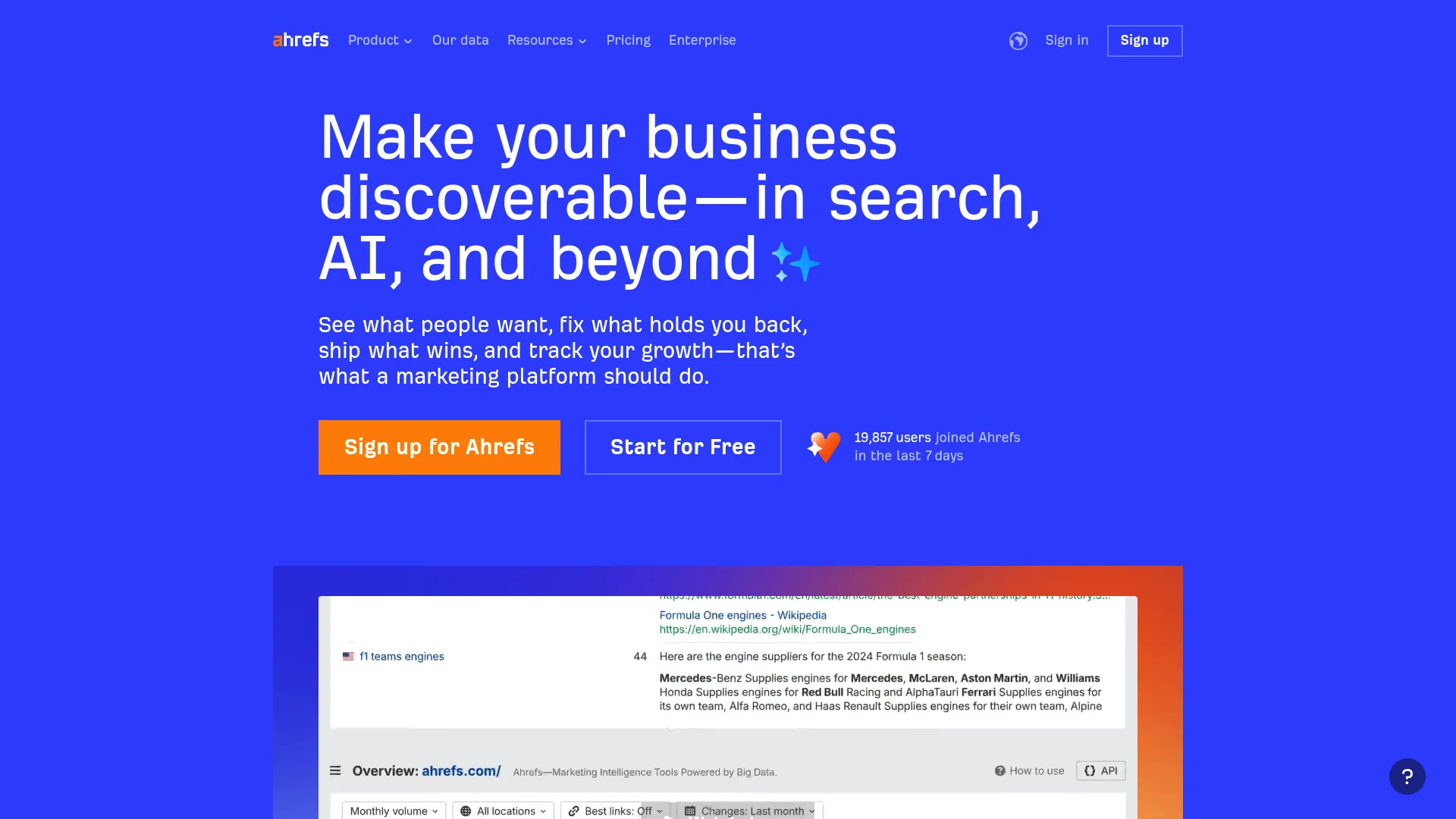
Features That Actually Matter
Site Explorer serves as the platform’s flagship feature, offering comprehensive domain analysis including organic traffic estimates, backlink profiles, and top-performing pages. The data accuracy here consistently outperforms competitors, making it reliable for strategic decisions that actually impact your business.
Keywords Explorer houses a database of 28+ billion keywords across multiple search engines and countries. The tool provides search volume, keyword difficulty scores, and SERP analysis with remarkable precision. Content Explorer helps identify viral content in your niche by analyzing social shares and backlinks.
Site Audit crawls your website to identify 170+ technical SEO issues, from broken links to page speed problems. While not as comprehensive as specialized technical SEO tools, it covers essential optimization areas effectively.
What Makes Ahrefs Worth It
The platform’s data accuracy stands unmatched in the industry. When I compare Ahrefs metrics against actual Google Search Console data, the alignment consistently impresses – usually above 90%. This reliability makes it trustworthy for high-stakes SEO decisions.
Historical data and trend analysis capabilities provide valuable context for SEO strategies. You can track competitor growth patterns, identify seasonal trends, and understand long-term market shifts that inform strategic planning.
The interface, while complex initially, becomes intuitive once mastered. Advanced users appreciate the depth of filtering options and customization capabilities that allow for sophisticated analysis.
The Reality Check
But here’s the thing nobody tells you: Ahrefs has a learning curve that’ll make you question your life choices. The first time I logged in, I felt like I was trying to fly a spaceship. There are buttons everywhere, and half the features have names that sound like they were invented by engineers.
The price tag is another reality check. At $129/month minimum, it’s not exactly pocket change. And that’s just the starter plan – if you want the good stuff, prepare to shell out more than what most people pay for car insurance.
Local SEO and content creation tools lag behind competitors. While Ahrefs excels at research and analysis, it doesn’t provide comprehensive solutions for content optimization or local business management.
Criteria Evaluation
- Data Accuracy: 5/5 – Industry-leading precision across all metrics
- Feature Completeness: 5/5 – Comprehensive SEO research and analysis tools
- Ease of Use: 3/5 – Powerful but complex interface requires training
- Value for Money: 3/5 – Premium pricing justified by data quality
- Agency Features: 4/5 – Good collaboration tools but limited white-labeling
What Users Actually Say
SEO professionals consistently praise Ahrefs for data reliability and competitor analysis capabilities. Many consider it essential for serious link building campaigns and competitive research. However, smaller businesses often cite cost concerns and complexity as barriers to adoption.
Source: SEO community forums and professional reviews
Pricing Reality
Plans start at $129/month for the Lite plan, suitable for small teams or individual consultants. Standard ($249/month) and Advanced ($449/month) plans add more features and higher usage limits. Enterprise plans reach $1,499/month for large organizations requiring extensive data access.
Annual subscriptions offer two months free, making long-term commitments more economical. However, the lack of a free trial means you’ll need to commit before testing the platform thoroughly.
My honest take: If you’re serious about SEO and have the budget, Ahrefs is worth every penny. But if you’re just starting out or working with tight margins, maybe cut your teeth on something simpler first.
Find Ahrefs at their official website to explore current pricing and features.
Semrush
Best Known For: Comprehensive Digital Marketing Suite
Semrush is like the Swiss Army knife of digital marketing tools – it does everything, which is both awesome and overwhelming. I’ve seen grown marketers cry trying to find the social media scheduler buried somewhere in the 55+ tools they offer.
The platform’s strength lies in its international coverage and multi-channel approach. With data spanning 142 countries and integration across various marketing disciplines, Semrush provides a unified view of digital marketing performance.
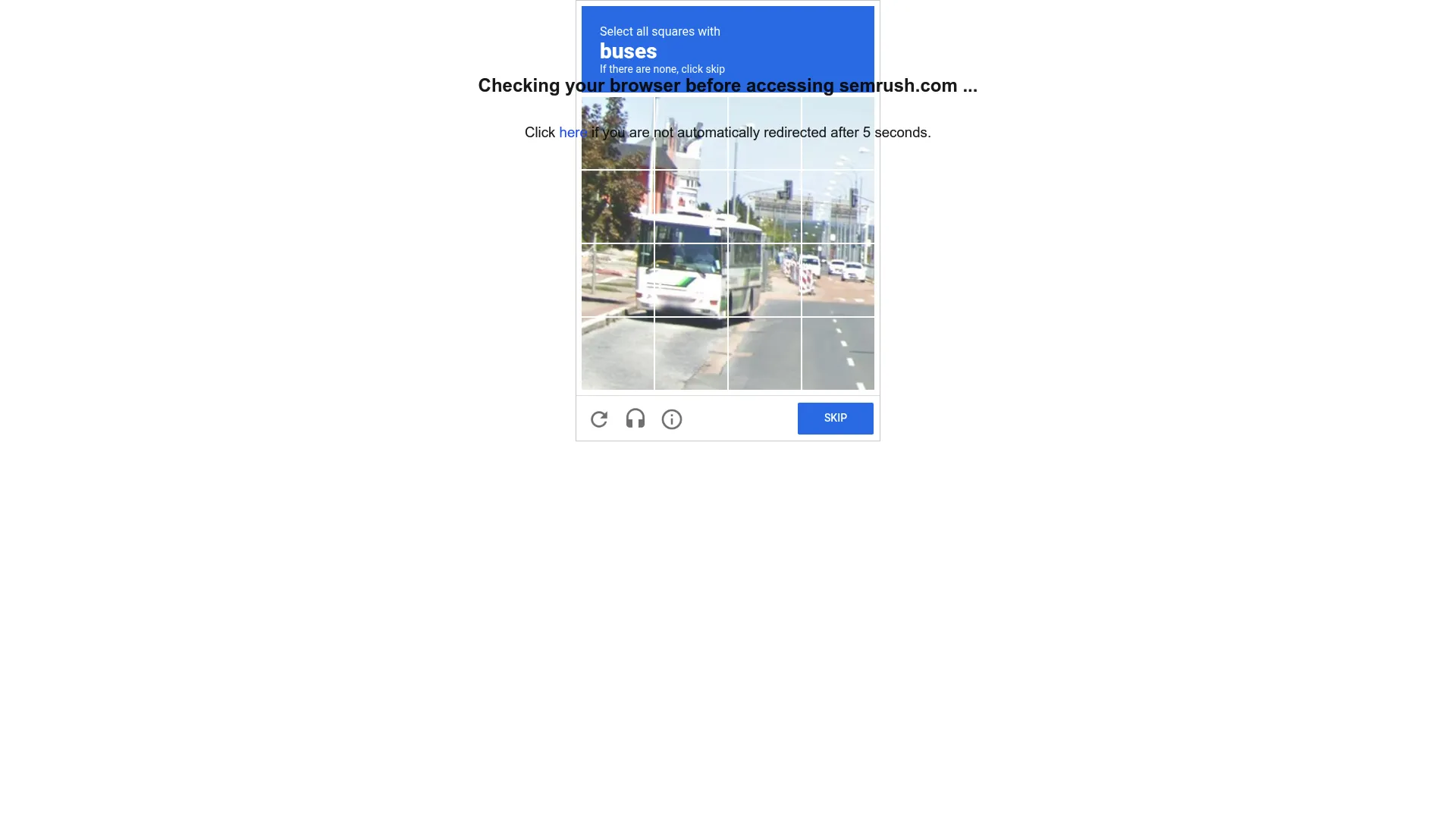
Features That Stand Out
The Keyword Magic Tool stands out with advanced filtering capabilities and semantic keyword grouping. It helps identify long-tail opportunities and understand search intent patterns across different markets and languages.
The AI SEO Toolkit caught my attention because, let’s face it, we’re all trying to figure out this whole ChatGPT thing. They’re actually tracking how your content shows up in AI search results, which feels pretty forward-thinking (even if I’m still not sure what to do with that data).
Content Marketing Toolkit includes writing assistance, topic research, and content optimization features. The SEO Writing Assistant provides real-time recommendations while you create content, streamlining the optimization process.
Social Media and PPC management tools integrate seamlessly with SEO data, allowing for coordinated campaigns across channels. This integration proves valuable for agencies managing multiple marketing disciplines.
Why Agencies Love It
Feature comprehensiveness surpasses all competitors. Whether you need keyword research, technical audits, content optimization, or social media management, Semrush provides capable tools within a single platform.
Agency features excel with white-label reporting, client management capabilities, and team collaboration tools. The platform clearly designed these features with agency workflows in mind.
International database coverage supports global SEO campaigns effectively. The tool provides localized data for most major markets, making it suitable for multinational businesses.
The Frustrating Parts
What drives me nuts is the interface. It’s powerful, sure, but finding what you need feels like navigating a mall without a map. I’ve been using it for two years and still discover new features by accident. My team needed a solid month of training before they stopped asking me where everything was located.
The pricing starts reasonable at $139.95/month, but here’s the catch – you’ll probably need add-on toolkits for the really useful stuff. Before you know it, you’re paying $400+ monthly and wondering how you got there.
The learning curve proves steep for teams unfamiliar with comprehensive digital marketing platforms. Training becomes essential for effective utilization, adding time and cost considerations.
Criteria Evaluation
- Data Accuracy: 4/5 – Reliable data across most metrics with occasional discrepancies
- Feature Completeness: 5/5 – Most comprehensive feature set available
- Ease of Use: 3/5 – Complex interface requires significant training
- Value for Money: 3/5 – Expensive but justified for agencies using multiple features
- Agency Features: 5/5 – Excellent white-label reporting and client management
What Users Actually Say
Digital marketing agencies frequently recommend Semrush for its comprehensive feature set and agency-friendly tools. Users appreciate the platform’s ability to handle multiple marketing channels within one interface. However, smaller businesses often find it overwhelming and expensive for basic SEO needs.
Source: Digital marketing agency reviews and platform comparisons
Pricing Reality
Pro plans start at $139.95/month, suitable for small teams managing basic SEO and PPC campaigns. Guru ($249.95/month) and Business ($499.95/month) plans add advanced features and higher usage limits. Custom Enterprise solutions are available for large organizations.
Additional toolkits (Content Marketing, Social Media, etc.) require separate subscriptions, potentially doubling monthly costs for full platform access.
Bottom line: Great for agencies managing multiple clients and marketing channels. Overkill if you just need basic SEO tools. And please, budget time for training your team.
Explore Semrush features and pricing at their main website.
SE Ranking (What We’re Comparing Against)
Best Known For: User-Friendly All-in-One Platform
Since we’re looking for alternatives TO SE Ranking, let me tell you why people are jumping ship (and why some should probably stay put).
SE Ranking hits that sweet spot of being comprehensive without making you feel stupid. The interface actually makes sense from day one, which is more than I can say for most SEO tools. Their AI search tracking is surprisingly solid for the price point.
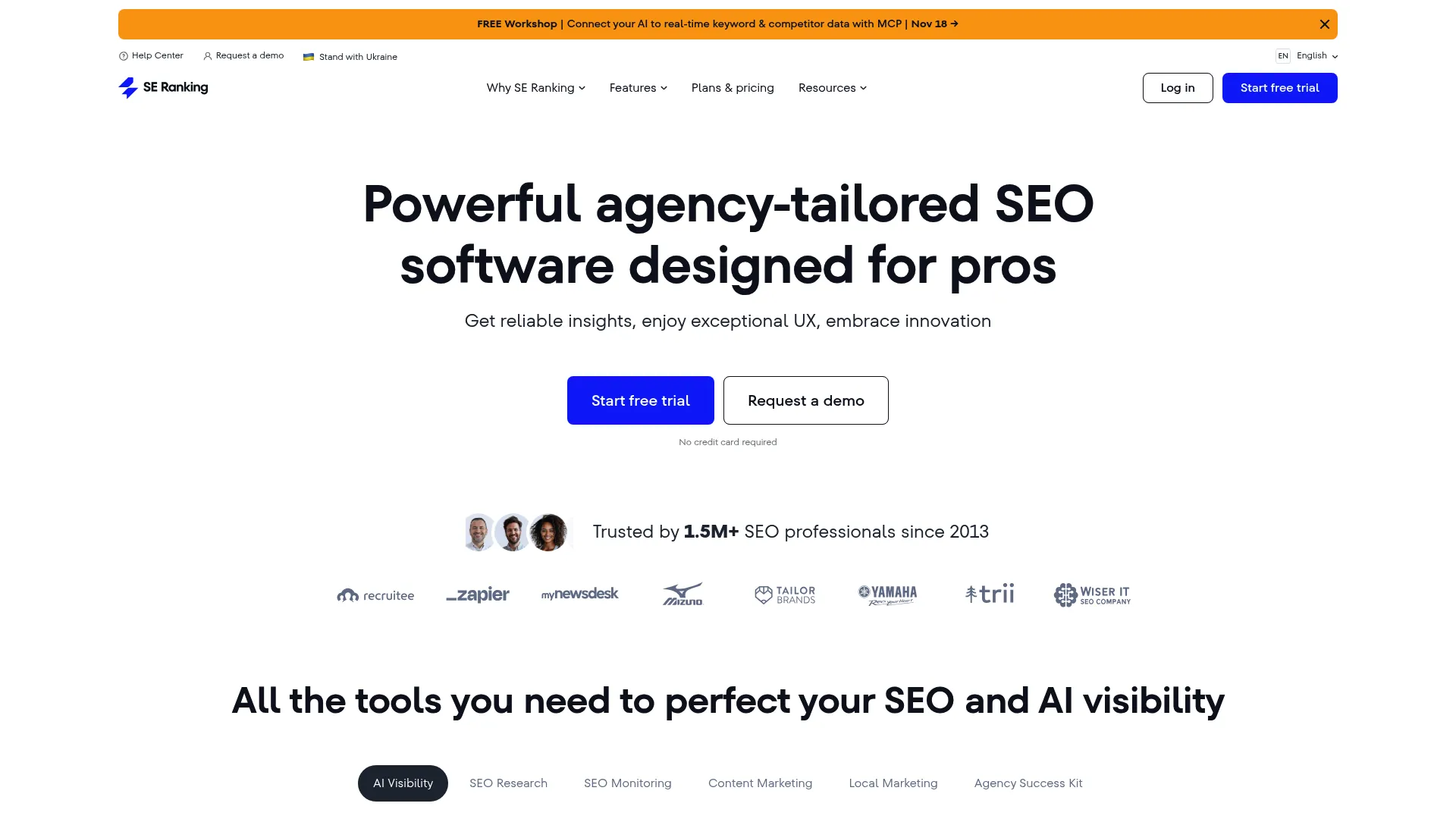
Features That Work Well
AI Search Toolkit addresses modern SEO challenges by tracking visibility across generative search platforms. This feature helps monitor brand mentions and content performance in ChatGPT, Perplexity, and similar AI-powered search tools.
Content Marketing module includes an AI writer and optimization recommendations. While not as sophisticated as dedicated content tools, it provides valuable assistance for teams creating SEO-focused content.
Local Marketing toolkit manages Google Business Profile optimization and local search performance. This feature proves particularly valuable for businesses with physical locations or service areas.
Website Audit performs 100+ technical SEO checks, identifying issues that impact search performance. The recommendations are actionable and prioritized by impact, making it easy to focus on high-value improvements.
Why People Like It
The interface prioritizes user experience without overwhelming complexity. New team members can become productive quickly, reducing training time and improving adoption rates.
Pricing remains competitive across all plan levels. The flexible pricing structure accommodates growing businesses without forcing expensive upgrades for basic feature access.
The 14-day free trial provides full feature access, allowing thorough evaluation before commitment. This transparency builds confidence in the platform’s capabilities.
Customer support and onboarding receive consistent praise from users. The team provides helpful guidance during setup and ongoing usage, reducing frustration for new users.
The Main Complaints
The main complaints I hear? The backlink database isn’t as robust as the big players, and sometimes their traffic estimates are… optimistic. I’ve seen them overestimate organic traffic by 30-40%, which can mess with your client expectations.
Advanced technical SEO diagnostics lag behind specialized tools. While adequate for most needs, enterprise-level technical audits may require supplementary tools.
Criteria Evaluation
- Data Accuracy: 4/5 – Generally reliable with occasional underreporting
- Feature Completeness: 4/5 – Comprehensive coverage of essential SEO functions
- Ease of Use: 5/5 – Industry-leading user experience and interface design
- Value for Money: 5/5 – Excellent pricing for feature set provided
- Agency Features: 4/5 – Good white-label reporting and client management
What Users Say
Users consistently praise SE Ranking’s balance of features and usability. Small to medium agencies appreciate the comprehensive feature set at accessible pricing. However, enterprise users sometimes require more advanced capabilities found in premium tools.
Source: SEO tool comparison reviews and user testimonials
Pricing Information
Essential plans start at $65/month, providing core SEO features for small teams. Pro ($119/month) and Business ($259/month) plans add advanced features and higher usage limits. All plans include white-label reporting and agency features.
The pricing structure remains transparent with no hidden fees or credit limitations on core features.
Real talk: If SE Ranking is working for you but you just need more data or specific features, maybe don’t fix what isn’t broken. Sometimes the grass isn’t actually greener.
Visit SE Ranking’s website to start your free trial and explore features.
Mangools
Best Known For: Exceptional User Experience
Mangools is what happens when developers actually care about user experience. It’s so clean and intuitive that I’ve had interns become productive on day one – no joke.
The tool suite’s design philosophy prioritizes clarity and ease of use. Each tool serves a specific purpose and excels at its designated function, creating a cohesive workflow that feels natural from the first use.
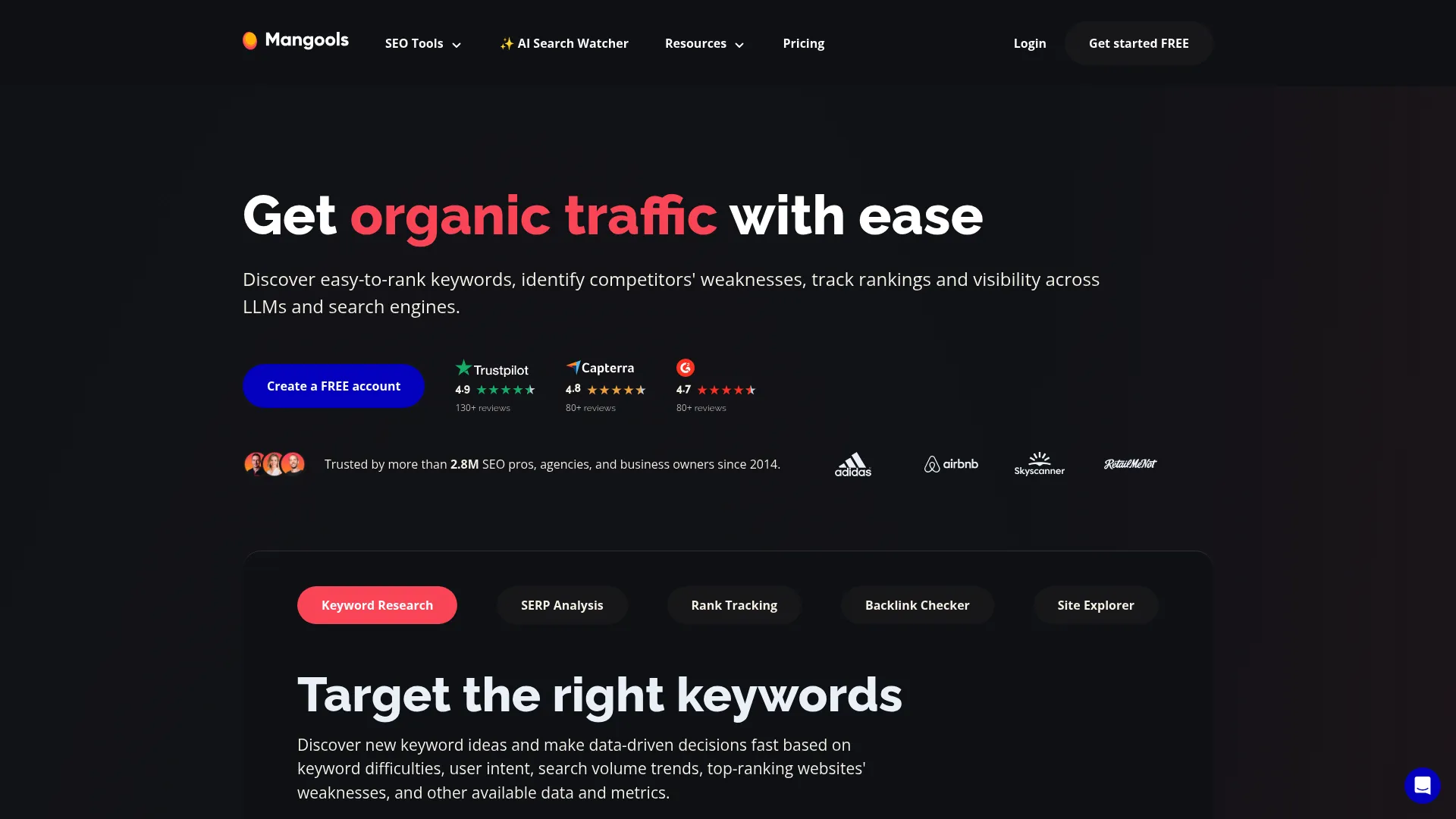
Features That Actually Work
KWFinder is their crown jewel for long-tail keyword research. I’ve found keywords with decent search volume and low competition that bigger tools completely missed. It’s like finding twenty-dollar bills in your old jacket pockets.
SERPWatcher provides rank tracking with a unique Performance Index that summarizes overall ranking performance. This metric helps quickly assess SEO progress without diving into detailed keyword-by-keyword analysis.
LinkMiner analyzes backlink opportunities and competitor link profiles. While not as comprehensive as Ahrefs, it provides sufficient data for most link building campaigns at a fraction of the cost.
SiteProfiler offers domain analysis including traffic estimates, backlink profiles, and top-performing content. The clean data presentation makes it easy to understand competitor strategies quickly.
Why It’s Great for Beginners
User experience stands unmatched in the SEO tool space. The interface feels intuitive immediately, requiring minimal training for team adoption. This accessibility reduces onboarding time and improves productivity.
The whole suite feels cohesive, like the five tools were actually designed to work together (revolutionary concept, I know). Everything just flows naturally from one task to the next.
Pricing remains affordable for small teams and freelancers. The feature-to-cost ratio provides excellent value, especially for users who don’t need enterprise-level capabilities.
Data visualization presents complex information clearly. Charts, graphs, and metrics are designed for quick comprehension, making strategic decisions faster and more confident.
The Reality Check
Here’s the reality check: if you’re managing enterprise-level campaigns or need deep technical audits, Mangools will leave you wanting more. It’s like bringing a really nice pocket knife to a construction site – great tool, wrong job.
Database size is smaller than enterprise competitors. This limitation affects competitive analysis depth and keyword opportunity identification in highly competitive markets.
Basic plan restrictions can feel limiting for growing businesses. Keyword tracking limits and search volume caps may require upgrades sooner than expected.
Automation capabilities are minimal. Users seeking automated reporting or optimization suggestions will find the platform lacking compared to AI-powered alternatives.
Criteria Evaluation
- Data Accuracy: 4/5 – Reliable keyword and ranking data with good SERP accuracy
- Feature Completeness: 4/5 – Covers essential SEO functions effectively
- Ease of Use: 5/5 – Unmatched simplicity and intuitive design
- Value for Money: 5/5 – Outstanding feature-to-price ratio for target audience
- Agency Features: 3/5 – Basic reporting capabilities, limited client management
What Users Actually Say
Freelancers and small agencies consistently highlight Mangools’ approachable design and effective keyword research. Users appreciate the straightforward pricing without hidden costs or complex credit systems. However, larger operations often outgrow the platform’s capabilities as their needs expand.
Source: Freelancer communities and small business SEO forums
Pricing Structure
Basic plans begin at $29.90/month, ideal for individual users and small projects. Premium ($44.90/month) and Agency ($129.90/month) tiers expand keyword limits and add team features. Annual billing provides significant discounts across all plans.
The transparent pricing model includes all features without additional toolkit costs or credit restrictions.
My verdict: Perfect for beginners or anyone who values simplicity over complexity. Your sanity will thank you.
Discover Mangools’ full capabilities at their official platform.
Moz Pro
Best Known For: Beginner-Friendly SEO Foundation
Moz Pro is like having a really patient SEO teacher. They don’t just give you data – they explain why it matters and what to do about it. Their educational content is legitimately helpful, not just marketing fluff.
Their approach focuses on building SEO knowledge alongside providing tools. This educational emphasis creates confident users who understand not just what to do, but why specific actions matter for search performance.
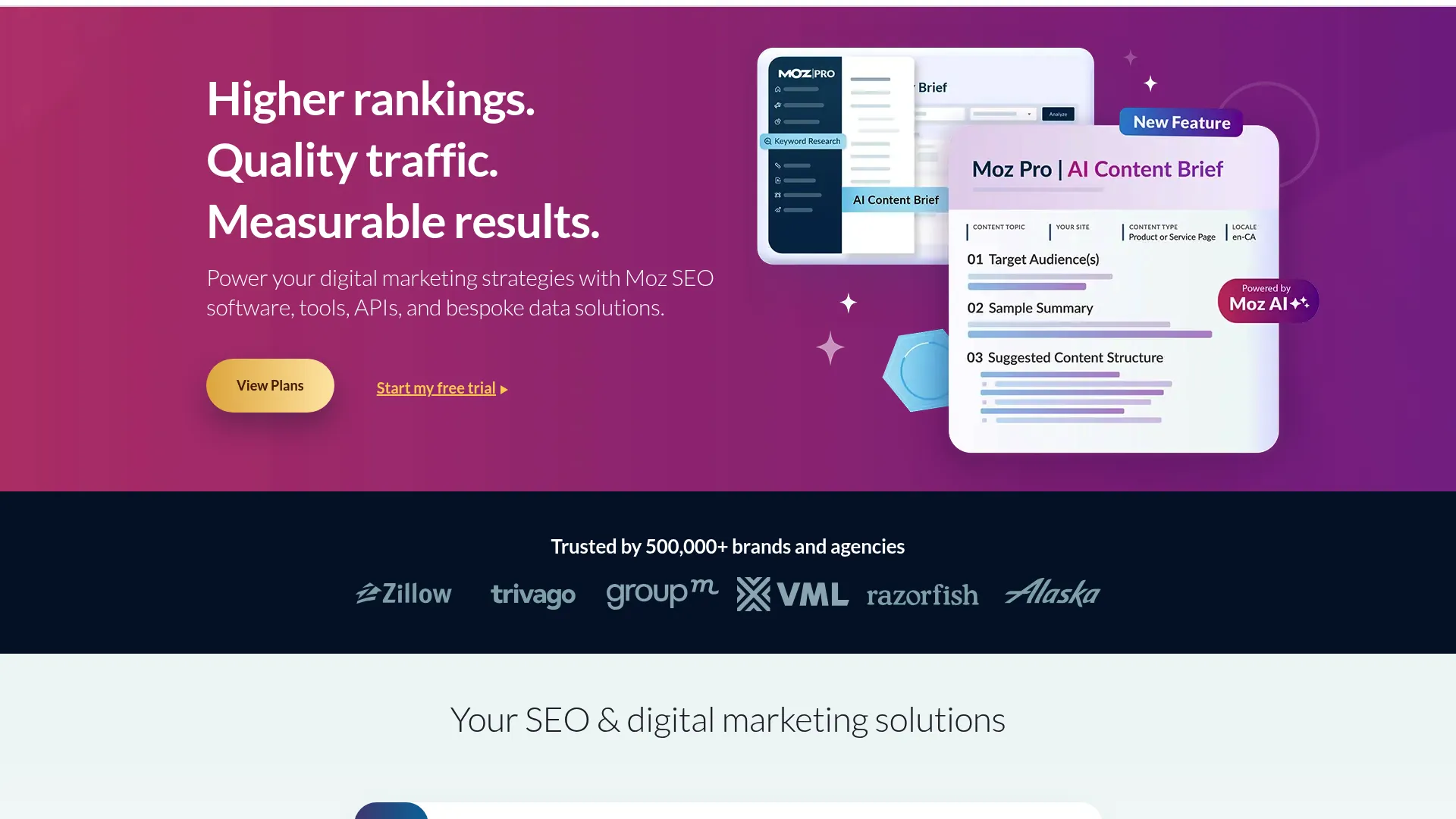
Features That Teach While They Work
Keyword Explorer provides reliable search volume data with clear difficulty metrics. The tool explains why certain keywords are challenging and suggests alternatives, helping users make informed decisions rather than blind guesses.
Site Crawl identifies technical issues with detailed explanations of their impact. Rather than simply listing problems, Moz explains how each issue affects search performance and provides step-by-step resolution guidance.
Link Explorer analyzes backlink profiles with Moz’s proprietary Domain Authority metric. While the database is smaller than competitors, the quality scoring helps prioritize link building efforts effectively.
AI Overviews Tracking monitors visibility in Google’s AI-powered search results. This newer feature addresses evolving search landscapes while maintaining Moz’s educational approach.
Why Beginners Love It
Educational resources surpass all competitors. The platform includes comprehensive guides, webinars, and tutorials that transform novice users into knowledgeable SEO practitioners.
Interface design prioritizes clarity over complexity. New users can navigate effectively without extensive training, while experienced users appreciate the clean data presentation.
Domain Authority became industry standard for a reason. While it’s not a Google metric, it’s useful for quickly assessing link quality and competitive landscapes. The keyword data is surprisingly accurate too.
Transparent pricing eliminates surprises. All features are included in advertised prices without hidden costs or restrictive credit systems.
The Limitations
But let’s be honest – Moz feels a bit like it’s stuck in 2018. While everyone else is racing to add AI features and flashy dashboards, Moz is still focusing on the fundamentals. That’s either refreshing or frustrating, depending on your perspective.
The backlink database is smaller than Ahrefs or Semrush, which can be limiting for competitive analysis. And if you need advanced features, you’ll quickly outgrow what Moz offers.
Advanced reporting options are minimal compared to agency-focused platforms. Teams requiring detailed client reports or custom dashboards may need supplementary solutions.
Automation capabilities remain basic. Users seeking AI-powered optimization suggestions or automated workflow management will find limited options.
Criteria Evaluation
- Data Accuracy: 4/5 – Reliable keyword data with accurate search volumes
- Feature Completeness: 3/5 – Covers basics well but lacks advanced capabilities
- Ease of Use: 5/5 – Exceptionally accessible for beginners
- Value for Money: 4/5 – Fair pricing for educational value and core features
- Agency Features: 3/5 – Basic reporting without advanced client management
What the Community Says
SEO educators and beginners frequently recommend Moz Pro for its learning-focused approach. Users value the educational content and reliable basic features. However, experienced practitioners often supplement with more advanced tools for comprehensive campaigns.
Source: SEO education communities and beginner-focused forums
Pricing Options
Starter plans cost $49/month, suitable for small businesses beginning their SEO journey. Standard ($99/month), Medium ($179/month), and Large ($299/month) plans increase limits and add features. All plans include educational resources and basic reporting.
The pricing remains competitive for the educational value provided, though feature limitations may require upgrades for growing businesses.
Perfect for: SEO beginners who want to actually understand what they’re doing. Less ideal for agencies needing comprehensive competitive intelligence.
Access Moz Pro’s tools and educational resources at their main site.
Ubersuggest
Best Known For: Budget-Conscious SEO Solutions
Neil Patel’s Ubersuggest is the Honda Civic of SEO tools – reliable, affordable, and gets the job done without any bells and whistles.
At $12/month, it’s practically giving away features that other tools charge hundreds for. The lifetime deal (when available) is honestly a no-brainer for small businesses on tight budgets.
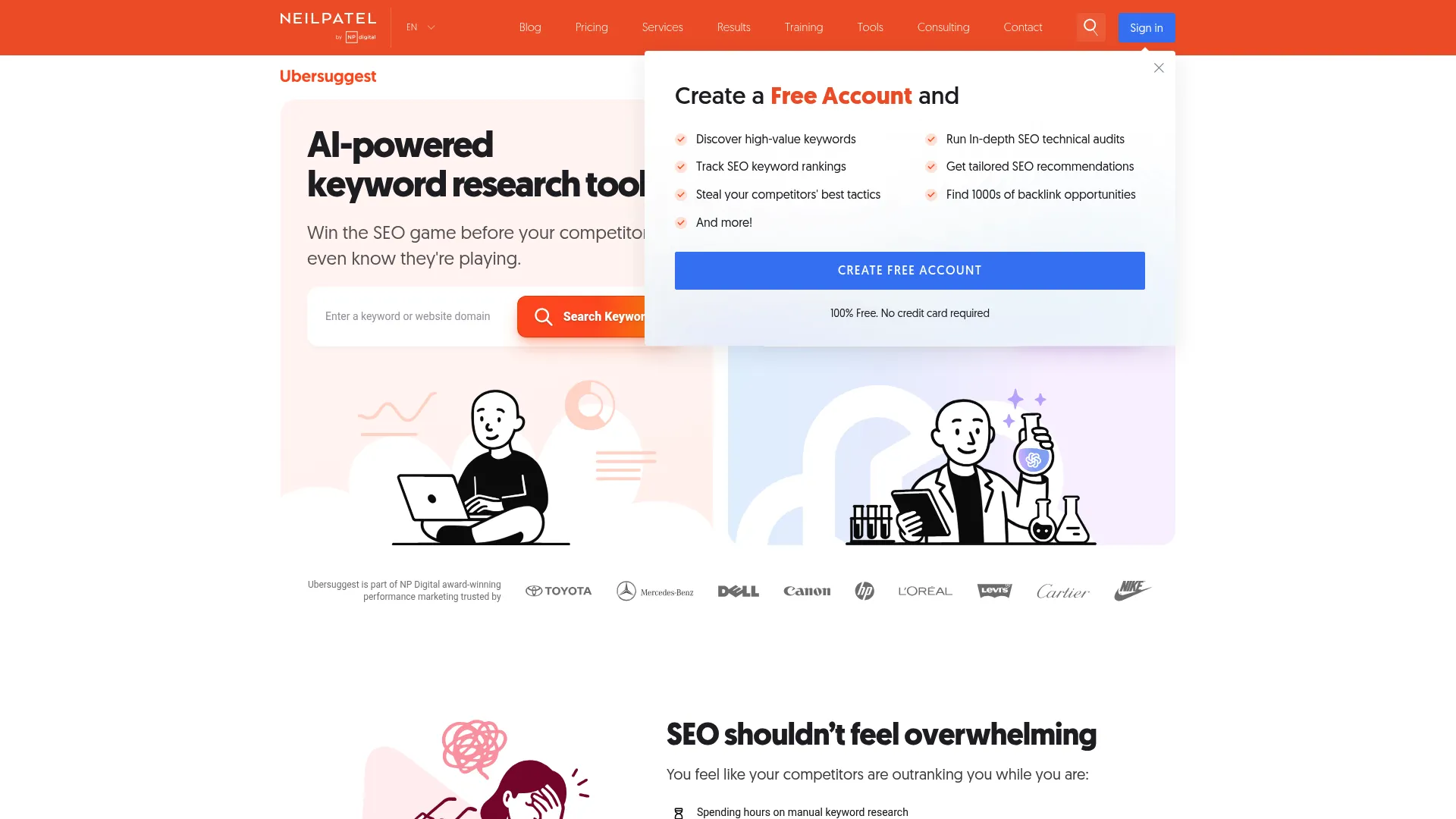
Features That Deliver Value
Keyword research provides competition analysis and search volume estimates across multiple countries. While not as precise as premium tools, the data suffices for most content planning and optimization decisions.
Site audit identifies technical SEO issues with prioritized recommendations. The simplified approach helps users focus on high-impact improvements without getting overwhelmed by minor technical details.
Backlink analysis reveals link building opportunities and competitor strategies. The database, though smaller, covers major link sources and provides actionable insights for most campaigns.
AI Search Visibility tool tracks brand mentions in ChatGPT and other AI platforms. This forward-thinking feature addresses modern search evolution at budget-friendly pricing.
Why It’s Perfect for Small Budgets
Pricing accessibility opens SEO tools to businesses previously priced out of the market. The lifetime license option eliminates ongoing subscription concerns for budget-conscious users.
Simplicity reduces learning curves and training requirements. Teams can become productive immediately without extensive onboarding or complex workflow adjustments.
Neil Patel’s brand recognition provides confidence and extensive educational content. Users benefit from proven SEO expertise and ongoing strategy guidance through associated content.
No complex credit systems or usage restrictions limit core features. Users can explore and experiment without worrying about exceeding arbitrary limits.
The Trade-Offs
Here’s the catch: you get what you pay for. The data isn’t as accurate as premium tools, and I’ve seen some wildly off traffic estimates. It’s fine for general direction, but I wouldn’t bet major strategic decisions on it.
The interface is refreshingly simple, though sometimes it feels TOO basic. If you’re used to advanced filtering and customization options, you might feel constrained.
Database coverage is limited in international markets and niche industries. This restriction affects global campaigns and specialized market research.
Enterprise features are virtually nonexistent. Large teams or agencies will find collaboration tools and advanced reporting inadequate for professional needs.
Criteria Evaluation
- Data Accuracy: 3/5 – Adequate for basic needs but inconsistent for strategic decisions
- Feature Completeness: 3/5 – Covers essentials without advanced capabilities
- Ease of Use: 5/5 – Extremely simple and accessible interface
- Value for Money: 5/5 – Unmatched pricing for features provided
- Agency Features: 2/5 – Minimal collaboration and reporting tools
User Feedback
Small business owners and freelancers praise Ubersuggest’s affordability and simplicity. Users appreciate the lifetime licensing option and straightforward interface. However, growing businesses often outgrow the platform’s capabilities as their SEO needs become more sophisticated.
Source: Small business and freelancer SEO communities
Pricing Details
Individual plans start at $12/month with basic features for single users. Business ($20/month) and Enterprise ($40/month) plans add capabilities and higher limits. Lifetime licenses are available starting at $290, eliminating ongoing subscription costs.
The pricing structure remains the most accessible in the SEO tool market, though feature limitations may require supplementary tools for comprehensive campaigns.
Real talk: If budget is your main concern and you need basic SEO functionality, Ubersuggest delivers incredible value. Just don’t expect enterprise-level accuracy or features.
Explore Ubersuggest’s affordable options at their website.
Nightwatch
Best Known For: Precision Rank Tracking Excellence
Nightwatch does one thing exceptionally well: rank tracking. And honestly, that focus shows in the quality.
Their ranking accuracy is spot-on, and the visual reports are gorgeous – the kind that make clients go “wow” in meetings. The white-label reporting options are probably the best I’ve seen.
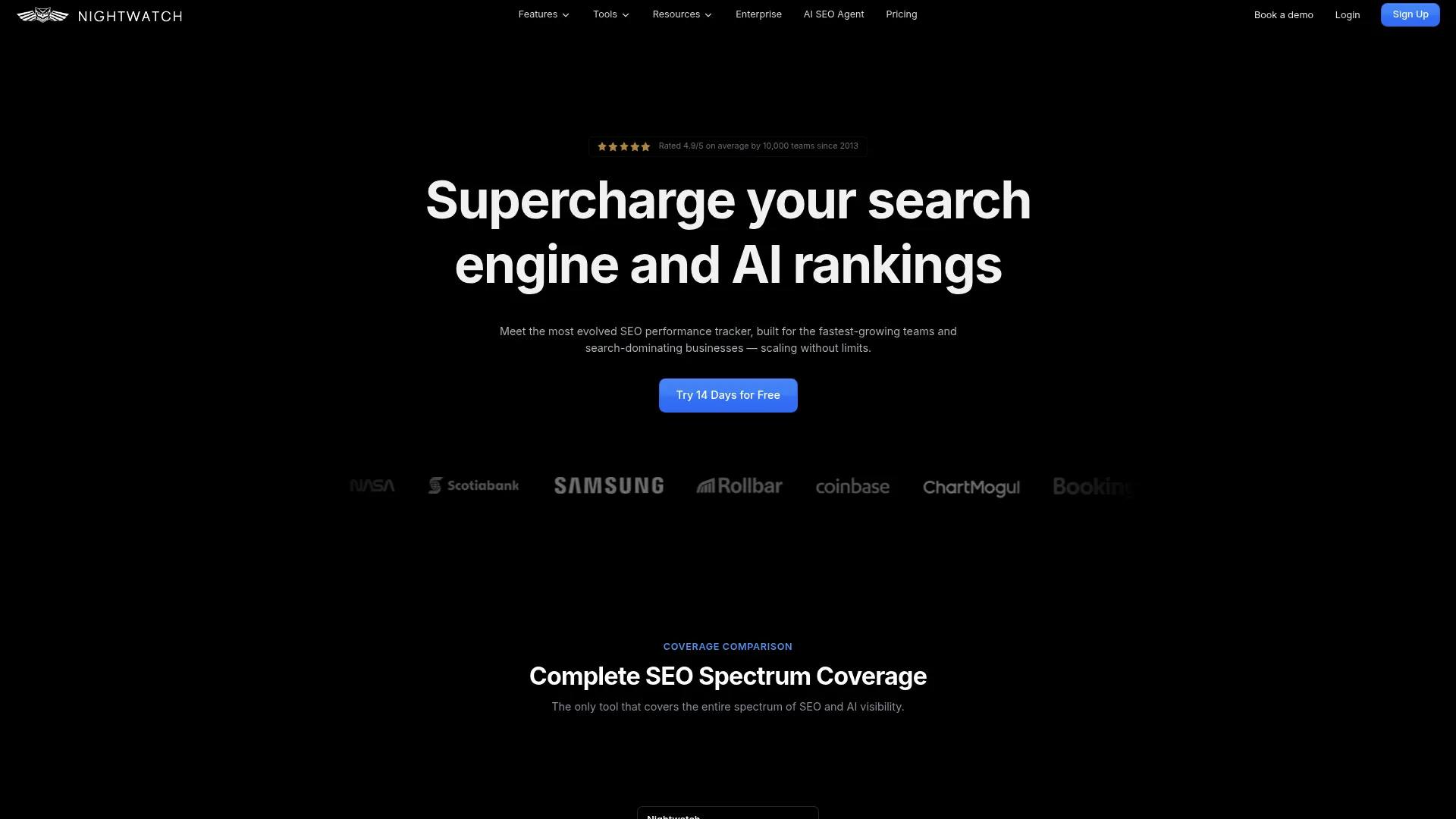
Features That Perfect Rank Tracking
Advanced rank tracking monitors positions across multiple search engines, devices, and locations with exceptional precision. The granular tracking options accommodate complex SEO campaigns requiring detailed performance monitoring.
The AI tracking for ChatGPT and other platforms is forward-thinking, even if we’re all still figuring out what to do with that data.
Customizable white-label reporting creates professional client presentations with branded dashboards. The visual quality and customization options exceed most comprehensive SEO platforms.
API access enables enterprise integration with existing systems and workflows. This flexibility supports large organizations requiring custom reporting or data integration.
What Makes It Special
Ranking accuracy surpasses all competitors through sophisticated tracking methodologies. The precision builds confidence in strategic decisions based on position data.
Visual presentation quality creates impressive client reports and internal dashboards. The beautiful design helps communicate SEO performance effectively to stakeholders.
Flexible pricing based on keywords tracked accommodates various campaign sizes. Users pay only for the tracking they need without forced feature bundles.
Customer support provides responsive assistance with setup and optimization. The specialized focus allows for expert guidance on ranking strategy and implementation.
The Catch
But here’s the limitation: it ONLY does rank tracking well. You’ll need other tools for keyword research, content optimization, and technical audits. For some agencies, that specialization is perfect. For others, it’s just another subscription to manage.
Costs escalate with large keyword sets, potentially exceeding comprehensive platform pricing. High-volume tracking campaigns may find better value in all-in-one solutions.
Narrow focus may not justify standalone subscriptions for small campaigns. Users with basic tracking needs might prefer integrated solutions.
Criteria Evaluation
- Data Accuracy: 5/5 – Industry-leading precision in rank tracking
- Feature Completeness: 3/5 – Excellent at core function but limited scope
- Ease of Use: 4/5 – Intuitive for ranking analysis but requires SEO knowledge
- Value for Money: 4/5 – Good value for specialized needs but can get expensive
- Agency Features: 5/5 – Outstanding white-label reporting and client management
User Reviews
SEO agencies consistently recommend Nightwatch for client reporting and precise ranking analysis. Users appreciate the accuracy and visual quality that impresses clients. However, most supplement with additional tools for comprehensive SEO management.
Source: SEO agency forums and professional tool reviews
Pricing Structure
Plans start at $32/month for 250 keywords, suitable for small campaigns. Mid-tier options ($159/month for 2,000 keywords) serve growing agencies, while enterprise plans reach $559/month for 10,000 keywords. Custom pricing accommodates larger tracking requirements.
Pricing scales with keywords tracked, which can get expensive fast if you’re monitoring large campaigns.
Best for: Agencies that prioritize beautiful client reporting and precise ranking data. Not ideal if you want an all-in-one solution.
Discover Nightwatch’s precision tracking at their platform.
Serpstat
Best Known For: Comprehensive Value Proposition
Serpstat is the underdog that punches above its weight class. At $69/month, you get features that would cost $200+ elsewhere.
Their approach balances feature breadth with cost efficiency, creating a viable alternative for teams requiring comprehensive capabilities without enterprise budgets.

Features That Provide Real Value
Keyword research includes clustering capabilities that group related terms for content strategy development. This organization helps identify content gaps and optimization opportunities more effectively than simple keyword lists.
Rank tracking covers multiple regions and devices with reliable accuracy. The multi-language support is genuinely helpful for international campaigns – something many “global” tools surprisingly struggle with.
Site audit provides actionable recommendations for technical SEO improvements. While not as detailed as specialized tools, it identifies major issues that impact search performance.
Competitor analysis reveals keyword gaps and content opportunities. The insights help identify areas where competitors are succeeding and suggest strategic improvements.
Why It’s a Smart Choice
Value proposition excels across all plan levels. The feature-to-price ratio provides comprehensive SEO capabilities at accessible costs for growing businesses.
The interface isn’t as polished as premium alternatives, but it’s functional and you adapt quickly. Think of it as the reliable workhorse rather than the flashy sports car.
Regional coverage extends beyond major English-speaking markets. This breadth supports businesses targeting diverse geographic markets.
The Trade-Offs
Database size trails premium competitors in comprehensive markets. This limitation affects competitive analysis depth and keyword opportunity identification.
Feature polish feels less refined than enterprise platforms. While functional, some tools lack the sophistication and accuracy of specialized alternatives.
Advanced automation remains limited compared to AI-powered competitors. Users seeking intelligent optimization suggestions may find capabilities insufficient.
Reporting customization options are basic for agency needs. Teams requiring detailed client presentations may need supplementary reporting tools.
Criteria Evaluation
- Data Accuracy: 4/5 – Generally reliable with occasional inconsistencies
- Feature Completeness: 4/5 – Comprehensive coverage of essential SEO functions
- Ease of Use: 4/5 – Intuitive interface with reasonable learning curve
- Value for Money: 5/5 – Excellent pricing for comprehensive feature set
- Agency Features: 4/5 – Good collaboration tools with basic reporting
Community Feedback
Growing agencies and international businesses frequently choose Serpstat for its comprehensive features at reasonable pricing. Users appreciate the multi-language support and broad functionality. However, enterprises often require more sophisticated capabilities found in premium platforms.
Source: International SEO communities and growing agency reviews
Pricing Information
Lite plans begin at $69/month, providing core features for small teams. Standard ($149/month) and Advanced ($299/month) plans expand capabilities and limits. Enterprise solutions ($499/month) add advanced features for larger organizations.
The pricing structure remains competitive while providing comprehensive functionality across all tiers.
Perfect for: Growing agencies that need comprehensive features without premium pricing. International businesses will especially appreciate the language support.
Explore Serpstat’s comprehensive platform at their website.
Surfer SEO
Best Known For: Content Optimization Mastery
Surfer SEO revolutionized how I approach content creation. Instead of writing first and optimizing later, it guides you during the writing process.
This approach transforms content creation from guesswork into a strategic process backed by SERP analysis and natural language processing insights.
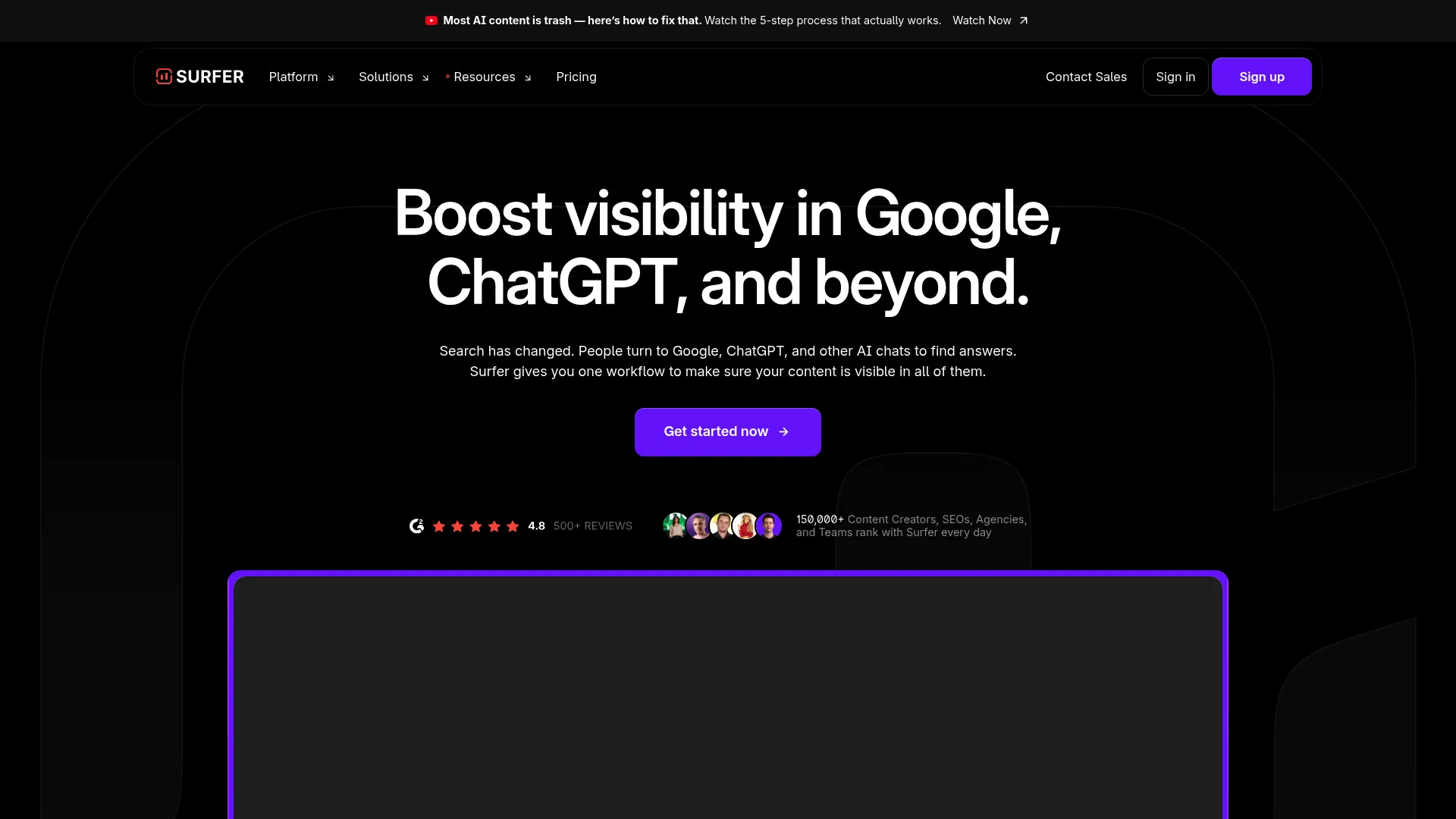
Features That Change Content Creation
The real-time content editor is genuinely helpful – it’s like having an SEO expert looking over your shoulder, suggesting improvements as you write. The SERP analysis reveals patterns in top-ranking content that you’d never notice manually.
AI-powered outline builder creates comprehensive content structures based on competitor analysis and search intent research. This feature accelerates content planning while ensuring comprehensive topic coverage.
Google Docs and WordPress integration enables optimization within existing writing workflows. Writers can receive recommendations without switching between platforms or disrupting established processes.
What Makes It Worth It
Content optimization accuracy helps create content that ranks consistently. The data-driven approach removes guesswork from content strategy and improves search performance predictably.
Real-time feedback accelerates the optimization process. Writers can address issues immediately rather than discovering problems after publication.
Integration capabilities fit seamlessly into existing content workflows. Teams can adopt the tool without major process changes or training requirements.
The Frustrations
But here’s the frustration: it’s ONLY good for content optimization. You’ll need separate tools for keyword research, rank tracking, and technical SEO. The credit system can also get expensive if you’re creating lots of content.
The Google Docs integration works well, though it occasionally glitches and you lose recommendations mid-sentence (learned that the hard way).
No rank tracking or technical SEO capabilities require supplementary tools. This limitation increases total tool costs for comprehensive SEO management.
Limited keyword research functionality affects content planning. Teams may need separate tools for topic discovery and keyword strategy development.
Criteria Evaluation
- Data Accuracy: 4/5 – Reliable SERP analysis with accurate content recommendations
- Feature Completeness: 3/5 – Excellent for content but lacks broader SEO tools
- Ease of Use: 4/5 – Intuitive for writers with minimal learning curve
- Value for Money: 3/5 – Expensive for high-volume content creation
- Agency Features: 3/5 – Basic collaboration without advanced client management
User Experience
Content marketers and SEO writers consistently praise Surfer’s ability to improve content performance. Users report higher rankings and better engagement from optimized content. However, teams need additional tools for complete SEO campaigns beyond content creation.
Source: Content marketing communities and SEO writing forums
Pricing Structure
Essential plans start at $89/month with limited content audits and optimization credits. Advanced ($179/month) and Max ($219/month) plans increase limits and add features. Scale plans ($219/month) provide higher usage allowances for content-heavy operations.
The credit system requires careful planning to avoid overage charges or workflow disruptions.
Bottom line: Essential for content-heavy SEO strategies. Expensive and limited if you need comprehensive SEO management.
Access Surfer’s content optimization tools at their platform.
SpyFu
Best Known For: Competitor Intelligence Specialization
SpyFu is like having a private investigator for your competitors’ digital marketing strategies. The historical data goes back years, showing you how competitor strategies evolved over time.
Their approach focuses on understanding what competitors do rather than providing comprehensive SEO management tools. This specialization creates unique value for strategic planning and competitive positioning.
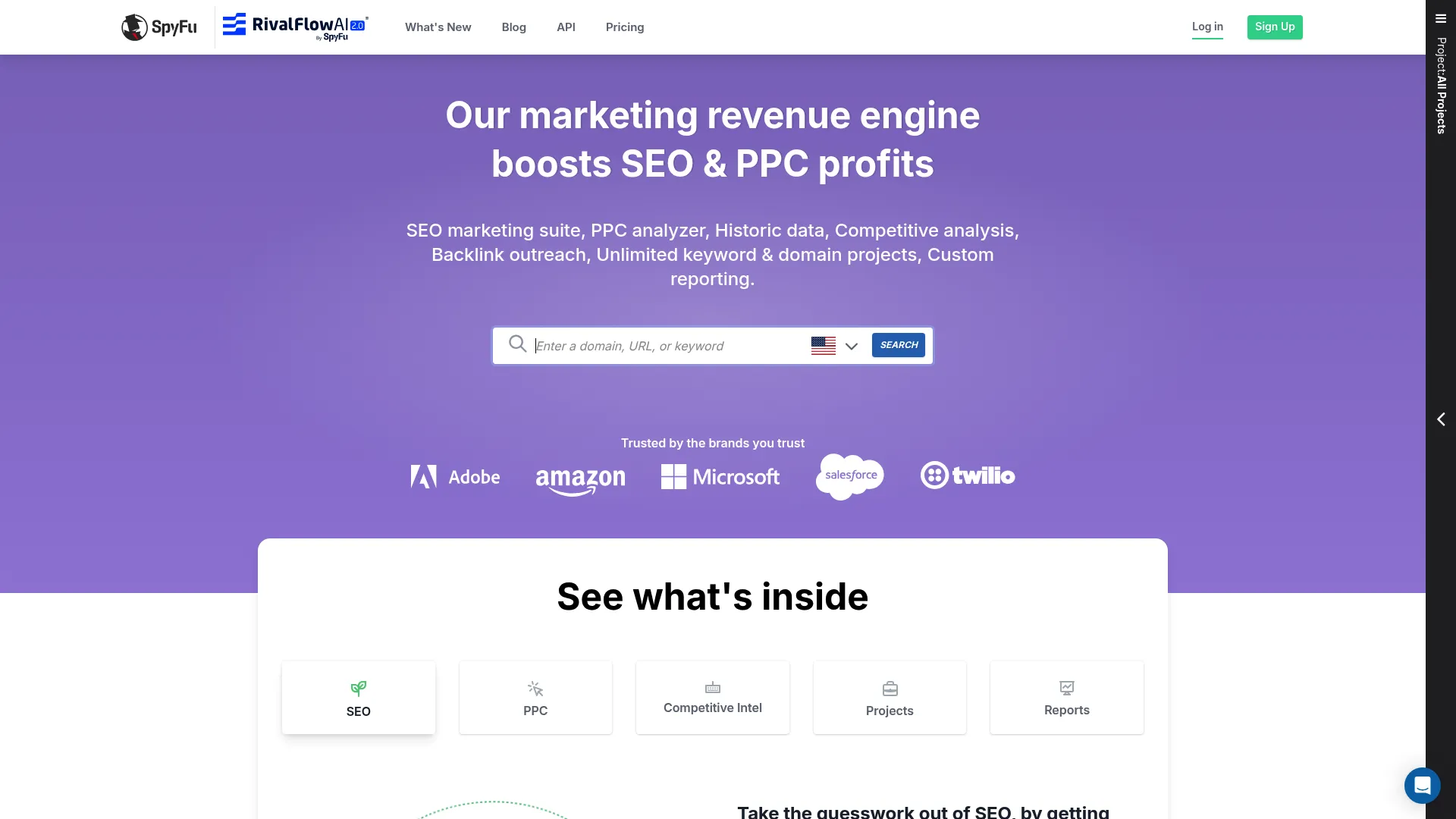
Features That Reveal Secrets
Competitor keyword analysis shows which terms drive traffic to competitor sites, including historical performance data. This intelligence helps identify successful strategies worth emulating or improving upon.
At $39/month, you get competitor intelligence that would cost significantly more elsewhere. The PPC research capabilities are particularly strong – you can see exactly which ads your competitors are running and how much they’re likely spending.
SpyGPT tracks brand mentions in ChatGPT responses, addressing modern search evolution. This feature helps monitor brand visibility in AI-powered search platforms.
Historical data extends back years, showing competitive evolution and seasonal patterns. This long-term perspective informs strategic planning better than snapshot analysis.
What Makes It Valuable
Competitive intelligence depth surpasses most comprehensive platforms. The historical perspective and PPC integration provide unique strategic insights.
PPC research capabilities complement SEO analysis effectively. The dual focus helps understand complete competitor digital marketing strategies.
Lead generation features identify potential clients and partners based on competitive analysis. This capability adds business development value beyond SEO insights.
The Limitations
The interface looks like it hasn’t been updated since 2015, but functionality matters more than aesthetics. The data is reliable and actionable.
The limitation? It’s primarily focused on English-speaking markets and doesn’t offer much for technical SEO or content optimization.
Database coverage focuses primarily on English-speaking markets. International campaigns may find limited value in non-English competitive analysis.
Content optimization tools are nonexistent. Teams need separate solutions for content strategy and optimization guidance.
Criteria Evaluation
- Data Accuracy: 4/5 – Reliable competitive data with good historical accuracy
- Feature Completeness: 3/5 – Excellent for competition but limited SEO tools
- Ease of Use: 4/5 – Straightforward despite dated interface
- Value for Money: 5/5 – Outstanding competitive intelligence at low cost
- Agency Features: 3/5 – Basic reporting without advanced client management
User Reviews
Competitive researchers and PPC specialists frequently recommend SpyFu for its unique intelligence capabilities and affordable pricing. Users value the historical data and dual SEO/PPC focus. However, most require additional tools for comprehensive SEO management.
Source: Competitive analysis and PPC communities
Pricing Options
Basic plans cost $39/month with essential competitive research features. Professional plans ($79/month) add advanced capabilities and higher usage limits. The pricing remains among the most affordable for competitive intelligence tools.
Annual subscriptions provide additional savings, making long-term commitments even more economical.
Great for: Competitive research and PPC intelligence. Not suitable as your primary SEO tool.
Discover SpyFu’s competitive intelligence at their website.
Notable Mentions
A few tools worth knowing about but didn’t make the main list:
DinoRANK
DinoRANK offers solid value, especially for Spanish-speaking markets. Their position tracking is accurate and affordable, with precise visibility graphs that compete with expensive alternatives. The TF*IDF analysis capabilities are particularly strong, though backlink data comprehensiveness lags behind premium tools.
Explore DinoRANK’s offerings at their platform.
Search Atlas
Search Atlas has interesting AI automation features, but the complexity can be overwhelming for smaller teams. The platform excels for agencies requiring automated workflows and AI-driven recommendations, though complexity issues and performance concerns affect large-scale operations.
Learn about Search Atlas capabilities at their website.
Clearscope
Clearscope does premium content optimization for enterprise budgets. Great if money isn’t a concern. The platform prioritizes content quality over quantity with sophisticated analysis tools, though expensive pricing and narrow focus limit accessibility for smaller operations.
Discover Clearscope’s content tools at their platform.
WriterZen
WriterZen offers lifetime deals occasionally, which is appealing for budget-conscious users. The platform provides comprehensive topic discovery and keyword research without recurring subscriptions, though limited AI search insights and article restrictions may hinder scaling efforts.
Explore WriterZen’s lifetime options at their website.
FAQ
Which alternative has the most accurate data?
Ahrefs, hands down. When I cross-reference their metrics with actual Google Search Console data, the alignment is usually above 90%. You pay premium prices for premium accuracy.
Semrush follows closely with reliable data across most functions, though occasional discrepancies appear in traffic estimates. Nightwatch excels specifically for rank tracking accuracy, while tools like Ubersuggest sacrifice some precision for affordability.
What’s the best budget option?
Depends on your definition of “budget.” Ubersuggest at $12/month covers basics adequately. Mangools at $30/month provides better user experience and more reliable data. Both beat paying $200+ monthly for features you might not need.
Serpstat offers the best middle-ground option at $69/month, providing comprehensive SEO features including international coverage and advanced analysis tools that growing businesses need.
Which tool is best for agencies?
For businesses seeking professional SEO management without the complexity of multiple tools, partnering with experienced SEO specialists often delivers better results than managing platforms independently.
Semrush if you need comprehensive marketing tools and don’t mind the learning curve. Nightwatch if you prioritize beautiful client reporting. Honestly though, many successful agencies I know use a combination rather than relying on one platform.
Ahrefs offers strong collaboration features and reliable data that agencies trust for strategic decisions, while SE Ranking provides good agency features at more accessible pricing for smaller operations.
How do these tools handle AI search optimization?
Full disclosure: I’m still figuring out this whole AI search thing. But from what I can tell, Semrush is ahead of the game here.
Modern SEO tools increasingly address AI search evolution through specialized tracking and optimization features. Semrush leads with comprehensive AI SEO Toolkit that monitors visibility across ChatGPT, Perplexity, and Google’s AI Overviews while providing optimization recommendations.
SE Ranking’s AI Search Toolkit tracks generative search performance and brand mentions across AI platforms. Ubersuggest includes AI Search Visibility tools despite its budget positioning, while Nightwatch extends tracking to LLM platforms like ChatGPT and Claude.
Traditional tools like Moz Pro are adding AI Overviews tracking, though implementation varies in sophistication and coverage across different platforms.
How do I handle the transition?
Start your new tool trial before canceling your current subscription. Export historical data where possible. Most importantly, budget extra time for team training – every tool has its quirks.
Data migration capabilities vary significantly between platforms. Ahrefs and Semrush provide comprehensive import tools for historical data, while simpler tools may require manual setup of tracking and campaigns.
Team training requirements depend on chosen alternatives. Mangools and Moz Pro require minimal training due to intuitive interfaces, while Ahrefs and Semrush demand significant learning investments for effective utilization.
Workflow integration affects productivity during transitions. Consider how new tools integrate with existing processes, reporting requirements, and client management systems. Most platforms offer trial periods allowing thorough evaluation before commitment.
Budget adjustments may be necessary depending on chosen alternatives. Premium tools like Ahrefs cost significantly more than SE Ranking, while budget options like Ubersuggest reduce costs but may require feature compromises.
Final Thoughts
Here’s what I wish someone had told me before I spent months testing every SEO tool on the market: the “perfect” tool doesn’t exist. They all have trade-offs.
Selecting the perfect se ranking alternatives ultimately depends on your specific requirements and constraints. Here’s what our comprehensive analysis reveals:
- Data accuracy leaders like Ahrefs provide unmatched reliability for strategic decisions but require significant budget investment
- Comprehensive platforms such as Semrush offer complete digital marketing solutions ideal for agencies managing multiple channels
- User-friendly options including Mangools and Moz Pro excel for teams prioritizing ease of use and educational support
- Budget-conscious choices like Ubersuggest and Serpstat deliver essential functionality without premium pricing
- Specialized tools such as Nightwatch and Surfer SEO excel in specific areas while requiring supplementary solutions
The SEO tool landscape continues evolving with AI search optimization becoming increasingly critical. Tools tracking visibility in ChatGPT, Perplexity, and Google’s AI Overviews will become essential as search behavior shifts toward generative platforms.
Understanding the relationship between Ahrefs vs Semrush can help narrow down your choice between the two premium options.
I’m the type of person who reads every review before buying a $20 gadget on Amazon, so you bet I went overboard testing these platforms. Consider starting with free trials to test data accuracy against your known metrics and evaluate workflow integration. Most platforms offer 7-14 day trials providing sufficient time for thorough evaluation.
At The Marketing Agency, we’ve implemented these platforms across hundreds of client campaigns, understanding which tools deliver results versus those that simply offer impressive feature lists. Our data-driven approach to internet marketing means we focus on performance outcomes rather than tool complexity.
For teams specifically looking at Ahrefs alternatives, our detailed analysis covers additional options beyond those mentioned in this guide.
We help businesses navigate SEO tool selection based on actual needs rather than marketing promises. Whether you need implementation guidance, team training, or strategic development that maximizes your tool investment, our expertise spans technical implementation and strategic optimization.
If you’re drowning in data but struggling with implementation, consider partnering with specialists who can actually execute strategies rather than just providing more dashboards to ignore.
Our SEO services range from $2,500 to $15,000 monthly, often paying for themselves through improved tool utilization and strategic implementation. We work with clients using various platforms, helping extract maximum value regardless of chosen tools.
Rather than struggling with tool selection alone, consider partnering with specialists who can guide decisions based on your specific goals, industry requirements, and growth trajectory. The right tool becomes significantly more powerful when combined with expert strategy and implementation.
Bottom line? Don’t overthink this. Pick one that fits your budget, learn it inside and out, then focus on actually doing SEO instead of endlessly comparing tools. Trust me, I wasted way too much time in analysis paralysis mode.
Most businesses would be better served mastering one tool completely rather than subscribing to three tools they barely use. Pick something that fits your budget and skill level, then focus on actually doing SEO work instead of endlessly comparing features.
The tools are just instruments – the real magic happens when you know how to use them strategically. And sometimes, the best investment isn’t another software subscription, but expertise that can maximize whatever tools you already have.
Ready to optimize your SEO approach with the perfect tool selection and expert implementation? Contact us to discuss how we can help drive measurable results for your business through strategic SEO management that goes beyond tool features to deliver real performance improvements.



